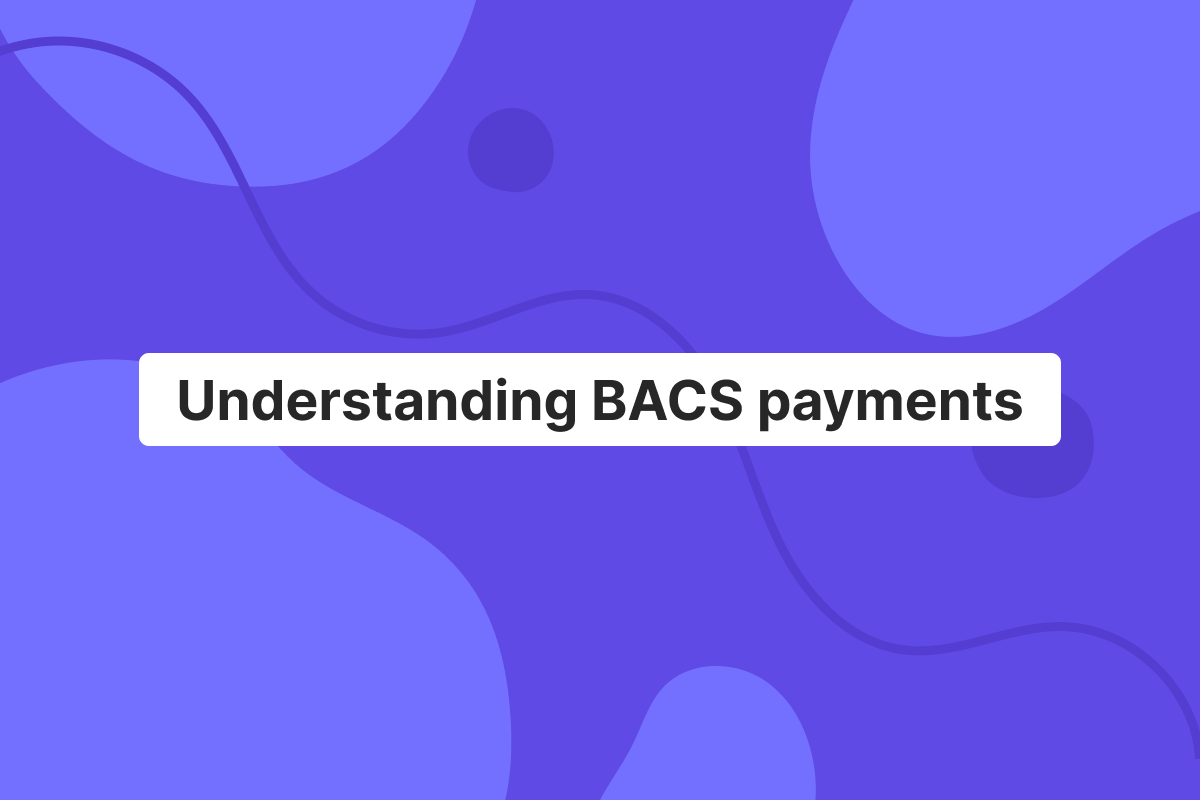A BACS payment is an electronic transfer of money made between banks in the UK. As one of the most popular and efficient methods of moving cash, it’s become a hugely important aspect of the financial world. Over 140 billion transactions have been carried out since it was established.
BACS stands for Bacs Payment Schemes Limited now, but it was originally known as the Bankers’ Automated Clearing System. This process was introduced in the late 1960s to avoid the delays and paperwork involved in using cheques as a bank payment system.
Read on to find out how BACS transfers work, the BACS payment meaning, and what benefits they offer when compared to other banking methods.
Introduction to BACS
BACS (Bankers’ Automated Clearing System) is a cornerstone of the UK’s financial infrastructure, enabling businesses and individuals to make and receive payments efficiently. Established in 1968, BACS has evolved into a highly reliable and secure payment method, processing over 130 billion transactions without error. This system facilitates bank-to-bank transfers, allowing for the seamless exchange of funds between UK bank accounts.
BACS payments are widely used for various purposes, including direct debits, direct credits, and bank transfers. Financial institutions, including banks and building societies, rely on the BACS system to facilitate electronic payments. The system is governed by strict rules and regulations to ensure the security and reliability of transactions.
Understanding how BACS works is essential for businesses and individuals who want to make and receive payments in the UK. Whether it’s for paying salaries, settling utility bills, or making charitable donations, BACS provides a dependable and efficient way to handle financial transactions.
What are BACS payments?
The BACS system is a safe, trustworthy process for sending money between banks in the UK. It is a fast, digital process that’s heavily regulated and offers clients a high degree of convenience. There are two different ways that you can make a BACS payment – direct debit and direct credit.
BACS direct debits
A BACS direct debit occurs when a customer authorizes their bank to allow a company to take money from their account. Customers must be given advance notice of the amounts and dates of upcoming payments. It is often done to cover recurring payments such as mortgages, insurance, or rent. A direct debit mandate form is required to authorize the company to withdraw payments from the customer’s account. BACS direct debit payments will be withdrawn from the account periodically until the authorization is canceled or the payments end. It can help business cash flow as the money is scheduled to arrive regularly.
BACS direct credits
BACS direct credit payments are used by many British organizations to pay money directly into the bank accounts of their customers. The BACS direct credit process is widely used for bank payments such as salary payments, pensions, and refunds.
BACS vs. Faster Payments
Faster Payments (FPS) have a lot in common with BACS transfers, but there are some crucial differences. The most notable is the speed with which the money arrives at the beneficiary’s account. A BACS payment through direct debit or direct credit usually takes three working days to go through to the receiving bank account, but Faster Payments are received almost instantly.
BACS Direct Credit has strict cut-off times for processing payments, which can lead to delays, making it unsuitable for immediate transactions.
Both these transfer methods are owned by Pay.UK. BACS payments are still widely used by government agencies, large multinationals, and other organizations that follow strict processes in terms of bank transfers. Faster Payments are more likely to be used by smaller companies such as online retailers.
A BACS payment can prove to be more efficient and cost-effective for companies that send a lot of bank transfers, as they’re grouped in batches before being sent. On the other hand, an FPS transfer is a good option for someone who carries out a limited number of bank transactions and wants them to go through quickly each time.
BACS vs. CHAPS
The CHAPS (Clearing House Automated Payment System) is another way of sending money between banks in the UK. It differs from the BACS payment method in that it’s used for same-day, one-off payments, which are similar to a BACS direct credit but faster. CHAPS is used for high-value transactions that require same-day processing. The deposit or payment made for a house purchase is a good example of when this payment system is typically a better option than BACS to get something paid the same day. CHAPS is also used to settle money market transactions.
While CHAPS transfers are faster than a BACS payment, they also tend to cost more to process. It means that a CHAPS payment is most commonly used for large, one-off bank payments that need to arrive swiftly. A BACS payment transfer can be used for smaller transfers like pensions and recurring payments that aren’t so urgent.
Open an account
in Genome online
How BACS payments work
The customer completes the authorization to make a direct debit, and the organization receiving the payments sets it up. Direct debits are used to collect payments directly from customers’ bank accounts. A direct debit payment schedule is then initiated, specifying the amounts to be collected from the bank account and the corresponding execution dates.
To make a BACS direct credit payment, the payee needs the name, bank account, and sort code of the receiving party. Salaries, pensions, and other direct credit monthly payments get paid each time smoothly, provided that the organization’s payment details are kept up to date. The sender’s account is debited on the third day after the payment order is initiated.
How long does a BACS payment take?
A BACS payment takes three working days to go through and begins with a payment being submitted to the BACS platform on the first day.
On the second day, the financial institution processes the BACS payment. On the third day, the funds are transferred to the receiving account, and the receiving bank account gets the funds.
Cost of BACS payments
The BACS cost varies according to the amount and the banks involved. However, this fee is extremely small and normally only runs to a few pennies in each case. The most common fee range for this type of bank-to-bank transfer is 5p to 50p (€ 0.06 to € 0.59). The account receiving payments isn’t charged any fee.
Setting up BACS
Setting up BACS payments involves a few essential steps, starting with having a UK bank account. Businesses and individuals need to apply for a Service User Number (SUN), a unique identifier that allows them to process BACS payments. It can be done through their bank or a BACS-approved bureau.
The setup process typically requires providing detailed information about the business and its bank account. Once the SUN is obtained, businesses can start making and receiving BACS payments. It’s crucial to ensure that the necessary infrastructure is in place to process these payments efficiently, including appropriate software and validation tools.
Businesses should also be aware of the costs associated with setting up and using BACS, such as setup fees and transaction fees. Despite these costs, the benefits of streamlined payment processes and improved cash flow make BACS a valuable tool for businesses.
Benefits of using BACS payments
The BACS electronic payment system provides a range of benefits as a payment method. This applies to both automated payments on a recurring basis and one-off transfers through direct debits and direct transfer methods.
Cost-effectiveness
The low cost of BACS payments makes this a cost-effective way to make bank transfers and pay bills. UK businesses can make payments directly or get paid regular payments without increasing their overheads or large bank charges. Both direct debit and direct credit methods are low-cost.
Reliability and security
Using BACS is a safe way to submit payments and make a direct credit transfer to a customer while avoiding scams. Bacstel-IP is an approved software solution that ensures secure access to payment systems. The banks that use this system have to use BACS-approved software that ensures that validation and encryption are completed. Businesses can establish direct access via a bank using BACS-approved software. All users of the BACS system must comply with current regulations to make or receive payments by direct debit or credit.
Streamlined financial operations
BACS is a streamlined payment system that enables the UK business world to operate smoothly by facilitating the easy transfer of money between banks and other financial institutions. A few basic account details are needed to make a transfer: sort code, account number, and account holder’s name. The direct debit system allows companies to receive regular payments effortlessly.
Convenience
The BACS transfer method is a highly convenient way of making electronic payments for a range of different reasons. BACS is also used for managing expenses such as supplier payments and employee reimbursements. Whether it’s for collecting payments, making supplier payments, or paying household bills by direct debit, it’s a process that makes banking easier for everyone who uses it. The BACS-approved bureau scheme lets third parties make payments on behalf of others, adding to the convenience for smaller businesses.
BACS payment errors
BACS payment errors can occur for various reasons, such as incorrect payment details or insufficient funds in the payer’s account. When a BACS payment is rejected, the payer is notified, and the payment is returned to the sender. To minimize the risk of errors, businesses should ensure they have accurate payment details and verify that the payer has sufficient funds.
In the event of a payment error, businesses should promptly contact their bank or the payer to resolve the issue. BACS payment errors can be costly and time-consuming, so it’s essential to take preventive measures. Using BACS payment validation tools can help check payment details and reduce the risk of errors. Regularly reviewing and updating payment information is also crucial.
By taking proactive steps to prevent payment errors, businesses can ensure that their BACS payments are processed efficiently and securely, maintaining smooth financial operations.
Emerging technologies and BACS
Emerging technologies like artificial intelligence and blockchain are revolutionizing the payments landscape, and BACS is evolving to incorporate these advancements. The use of APIs and open banking is making it easier for businesses to access BACS payment services, enhancing efficiency and security.
These technologies are also paving the way for new payment solutions, such as instant payments and request-to-pay services. BACS is collaborating with fintech companies to develop innovative payment solutions that cater to the needs of businesses and individuals.
The integration of emerging technologies is improving the customer experience and reducing the risk of payment errors. Businesses should stay informed about the latest developments in these technologies and explore how they can enhance their payment processes.
By embracing emerging technologies, businesses can stay ahead of the curve and capitalize on new opportunities in the payments market, ensuring they remain competitive and efficient in their financial operations.
Access BACS and other transfers inside Genome
Are you interested in BACS and other money transfer options within the UK, EU, and internationally? You can access international money transfers once you start a business account inside Genome.
Set up a business account, and you’ll be asked to carry out a short online verification process. Once your account is set up, you can find out if your business is eligible for international transfers and request account details.
Our international money transfer options include SWIFT, Faster Payments, TARGET2, BACS (incoming only), and CHAPS. Additionally, you can make regular and instant SEPA payments!
Open an account
in Genome online
Key takeaways
The BACS payment process is vital in the modern finance world, giving UK businesses and consumers a reliable, fast way of moving money from one bank account or building society account to another.
Direct debit and direct debit transfers provide easy ways to make a safe bank transfer using just a few basic payment details. The direct debit guarantee protects customers against errors and fraudulent transactions. The Bankers Automated Clearing System provides a trustworthy payment service that banks and building societies have been using for decades. It gives confidence to pay and receive payments.
Our compliance with all the latest payment security measures means that we keep your business safe at all times. Use Genome, and you’ll enjoy efficient and secure financial management that meets all your payment needs with no fuss. Start a business account and access Genome’s multiple money transfer options, as well as accept BACS payments.
FAQ
Can BACS payments be made internationally?
No, the BACS payment system is for direct credit and direct debit transfers from one UK bank or building society to another. You can make a BACS payment to virtually any British bank or building society, but IBAN or international transfers are needed to send money to a bank account abroad.
Are BACS payments safe and secure?
Yes, these bankers’ automated clearing services are highly trusted as a way of moving funds and making business payments. It’s used to make pension payments, pay loans on time, and carry out a full range of other financial transactions effectively.
How do I cancel a BACS payment?
The process for canceling a BACS payment varies according to the stage of the three working day process. They can be canceled before the cut-off time for submission to the bank before being executed or credited. Once sent to the receiving account on the third day, a recall can be requested. But success at this stage isn’t guaranteed.
Is there a maximum or minimum limit on BACS payments?
There is no minimum limit on the amount of a BACS bank transfer through direct debits or direct credits. In terms of the maximum BACS payment amount allowed, you might see $20 million mentioned. The exact limit is determined by each bank and may vary by the type of account or transfer.
How can I track a BACS payment?
A BACS payment can be tracked by contacting the organization that sends the payment request or by getting in touch with the payment service provider. Understanding the three working day process that every BACS bank transfer goes through will allow you to appreciate when it should leave one bank and reach the other.






